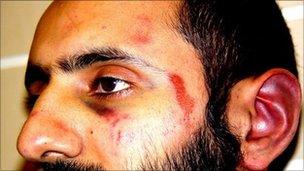US extradition law not biased against Britons - judge
- Published

Gary McKinnon has been fighting extradition for years
Laws governing the extradition of Britons to the US are fair, an independent review has concluded.
It follows high-profile cases, including that of Gary McKinnon, the alleged hacker who has been fighting extradition to the US for years.
The review, external, led by the former Court of Appeal judge Sir Scott Baker, says the treaty "does not operate in an unbalanced manner".
But Gary McKinnon's mother Janis Sharp said the finding as a "whitewash".
Home Secretary Theresa May commissioned the review - but it calls for her to be stripped of powers to determine extradition requests on human rights grounds and to let courts decide instead.
Sir Scott's report also says some criticism of the Extradition Act is based on a "misunderstanding" of how it works in practice.
The former judge also found the European Arrest Warrant system does not operate "unfairly or oppressively".
"No significant difference"
Several ministers criticised the Extradition Act 2003 while in opposition and the review follows widespread concern that the system is biased against Britain.
They argue it is unfair for the US to require "sufficient evidence to establish probable cause" before agreeing to extradite anyone to the UK, while Britons are denied the same protection.
But Sir Scott's 486-page report finds: "In our opinion, there is no significant difference between the probable cause test and the reasonable suspicion test.
"There is no practical difference between the information submitted to and from the United States."
The review contradicts the findings of Parliament's Joint Committee on Human Rights (JCHR), which called for the Government to renegotiate the UK's extradition treaty with the United States to ensure British citizens get the same protection as Americans.
In a report in June, external, the committee said US authorities should have to show enough evidence to establish probable cause before a Briton can be extradited.
"Unacceptable"
Nine cases, including those of Abu Hamza and Babar Ahmed, are still awaiting rulings, including two which involve allegations dating back to 1997.
"Delays of this kind are, in our view, unacceptable; they are unfair to the individual and militate against the prospects of a fair trial," the report says.

Babar Ahmad was arrested in a dawn raid on his home in south London in 2003
The family of Babar Ahmad, a counter-terrorism suspect held in jail for seven years contesting extradition to the United States, is among those who had called for a rethink.
Mr Ahmad's e-petition to government, external, asking to face trial in the UK, has recently gained enough signatures to make the top 10.
Ashfaq Ahmad, the suspect's father, said: "In June 2011, the Joint Committee on Human Rights expressed concern about Babar's case. That British Citizens accused of committing crimes in the UK can be extradited to the US in cases where the CPS has found no evidence to charge them in this country, completely undermines our criminal justice system."
Figures released in the report show between January 2004 and July 2011, there were 130 requests by the US for people to be extradited from the UK, compared with 54 requests from the UK to the US.
A total of seven US requests were refused by the UK, compared with none of the UK's requests.
But Sir Scott points out that the US population is about five times that of the UK.
The human rights group Liberty says it rejects Sir Scott's report and is urging the goverrnment to ignore it.
Shami Chakrabarti, director of Liberty, says: "We don't just disagree with this review but are completely baffled by it.
"This is not a court judgment, merely policy advice - and government cannot abdicate its responsibility to honour the promises of both Coalition parties in opposition.
But US Attorney General Eric Holder, who met the panel during their work on the review, said the "fundamental fairness of the treaty has been demonstrated by its application during the years the treaty has been in force".
"The treaty has enabled us to work closely with our partners in the United Kingdom to pursue the interests of justice in both our nations."
The home secretary said she would consider the report's recommendations carefully.
- Published24 February 2012
- Published25 May 2011
- Published22 June 2011
- Published30 September 2011